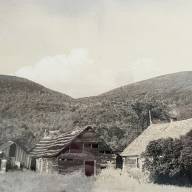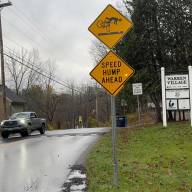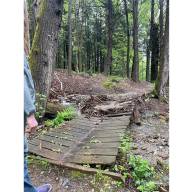Despite countless trips past the Gaylord land located on both sides of Route 100, I knew of little else besides the visible black and white cows, a service station I use, flowers and vegetables growing in the field in summer, a farm stand, and a CSA (Community Supported Agriculture) option available year-round.
I did know that at least 40 years ago a very kind woman, Eloise Gaylord, lived in the home on the site where our 8-year-old sought help. I had forgotten her at The Drug Store that once was next to Mehuron’s and, with the other six kids and my best friend, drove home to Warren unsuspecting. Clutching her bag with the Valentines she wished to give out the next day, she thought she could just walk home. In the dark and cold, seeing lights on, she knocked on the farmhouse door and, explaining her plight, asked if she could phone home.
Racing to retrieve her feeling enormous guilt and embarrassment, I was met on the porch by Mrs. Gaylord encircled in a white apron. She looked straight at me and said, “Never mind, I once left a little Gaylord at church.” Her kindness and words absolved me. I would also come to know her almost-famous husband Hap who owned and ran a gas station with two brands of gas — Texaco and Esso, a repair and towing service and was celebrated each year as he, in some sort of military garb, led the Fourth of July parade. Both parents are gone as is the farmhouse that was destroyed by fire in 2020 but that little Gaylord, Hadley, is now a grandparent to four and carries on the traditions of both his parents.
He credits his mom’s insights and beliefs about food and that only good, natural, food mattered. Her fresh food and all she managed to can, and preserve were always available to their six children plus the extras usually around. His dad, Hap, started a small dairy farm in 1948 before his interests took him into auto mechanics. He opened and ran a two-bay service center on the property. Hadley found he would rather have his hands in the dirt, shovel manure and grow food.
The result was developing 500 acres to raise chickens, hogs and cattle and grow organic and healthy food. The majority of the acreage is owned but some is leased. The farm, to be manageable, has pastures all over The Valley, divided into smaller paddocks so that water is available for the cattle. As the Angus, Simmental-Cross and some Belted Galloways graze on grass, they have to be checked on once a day and may have to be moved to feed on new grass.
Additionally, Hadley, his son Brendon who works full-time with him, or their helpers have to check on the chickens and feed the hogs twice a day. For feed, he travels as far as Northfield’s La Panciata organic bakery for their spent bread. There is also the task of transporting cows to a USDA inspected slaughterhouse and his products to Mehuron’s and Sun Flower Foods in Waterbury. We never got fully into all the ancillary things he does like haying, equipment maintenance and lending a hand in the garage when needed.
Asked why he chooses to make time each Saturday to anchor the north-end entrance to the farmers market, he said he gets a great deal of satisfaction out of it. He values being able to supply clean food that is the least trafficked — with his farm being but one mile from his stand. Some items are freshly picked that morning. Cartons of fresh eggs are available. A large cooler stocks frozen beef, pork, and chicken. He is thankful to have help from neighbors and his three daughters, Connie, Amy, and Jenny who alternate each week.
There is no question but that he is passionate about good, wholesome and organic food. He is greatly dismayed by the alternatives too many people eat, and he fears they are trying to kill themselves. He laments that there is so much volatility in today’s world, but there is no excuse for bad food.
He has been fortunate to hire two young people who help farm. They were drawn to the work because they value the organic commitment Hadley believes in. He feels that while it is very sad how many Vermont farms have been lost through the years, he is encouraged by the young people who want their own food and, therefore, do their own thing to make that happen. The emotion, passion, and gratitude he feels for what he grows and for the land on which he grows it, is palpable.
Hadley shares that it is very hard to farm, and that it definitely does not offer a 40-hour week. He starts between 5 and 6 a.m. and the outdoor work goes until dark every day. Only hard rain can make it an earlier day. Once home, he fixes dinner and may do paperwork before finding any time to relax. With any spare time, he enjoys anything outdoors. He will hike the Long Trail and treasures time away when he can get to Canada to hunt and fish or get out west to hunt white tail, elk, or mule deer. He’s never had a home outside The Valley but seems very content with that decision. On some summer days, Brendon will bring his young daughter to work adding the face of another Gaylord generation. This is more than okay with the grandpa she calls, “Chief.” Hadley’s notes with additional pride that his other son Amos is a policeman in Barre.
Observing his exchanges at the farmers market with regulars and visitors alike, his kind and earnest face lights up with warmth and cheerfulness. A friend, who said she was feeling a bit down on herself, related to me that as she headed out toward the parking lot just as the vendors were packing up, a man, she would learn was Hadley, approached her holding two sunflowers to ask if she might want them. This simple gesture altered her day.
It is not hard to see that the kindness and generous spirit his mother exemplified as well as the work ethic of his dad, lives on in Hadley. And, hopefully, the farm stays in the dedicated hands of the Gaylord family for generations to come and Valley residents continue to support and appreciate our local farms.
Contributing writer Sherman lives in Warren.













